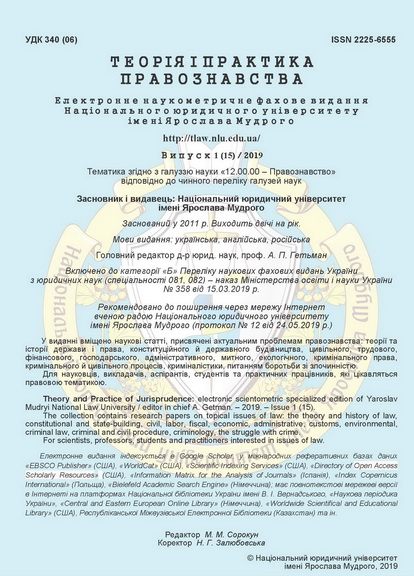Temporal effect of judicial precedent: USA experience
DOI:
https://doi.org/10.21564/2225-6555.2019.15.169847Keywords:
temporal effect of judicial precedent, retroactivity, prospectivity, judicial rulemaking, judicial precedentAbstract
This study focuses on the operation of US case law in time. Currently, the Ukraininan doctrine pays little attention to the experience of the US legal system in this matter. Meanwhile, such experience is important due to the recognition in Ukrainian doctrine and practice of the sources of law related to the activities of courts.
The author reviews the possible directions of operation in the time of the judicial precedent (in particular, retroactive, pure prospective and selective prospective effect), traces the history of their practical application at both the federal and state levels. The author then turns to in-depth analysis of the reasons that led to use a certain direction of operation in time by courts. In particular, the study focuses on the change in perception of the functions of the judiciary, in particular the recognition of judicial rulemaking as a factor having contributed to the widespread introduction of prospectivity. Therefore, the role of the legal predictability and the protection of legitimate expectations is regarded as the main grounds for the use of prospects.
The author has analyzed the critique of prospectivity, which led to a widespread refusal to use it at the federal level (it continues to be used at state level). Attention is drawn to the following arguments of the critics: prospectivity does not comply with established rules on the role of the judiciary and judicial rulemaking (according to which setting the operation of legal rules for the future falls within the legislative prerogative; at the federal level such an approach is justified by the provision of the US Constitution), undermines the principle of stare decisis, makes the ruling merely a dictum without obliging the courts to adhere to it. Under the influence of the latter, courts tend to use selective prospectivity instead of pure prospectivity. It has become the object of criticism because of the inequity and the randomness of the distribution of the effects of change. The US Supreme Court on this basis has terminated its use as well.
The author states that possibility of prospectivity remains a complex dilemma, far from a final solution. It reveals a conflict between such key values as legal certainty, equality, fairness, raises the question of the separation of powers. In addition, the problem reflects the issues of the nature of case law and the role of a judge in the functioning of the law. Despite the shift of American jurisprudence from the declaratory theory of judicial precedent, the latter continues to exist in the form of traditional retroactivity, which remains the main or the only form of the temporal effect of precedents in the United StatesReferences
Malyshev, B.V. (2002). Sudovyi pretsedent u pravoviy systemi Anhliyi (teoretyko-pravovyi aspekt): Candidate’s thesis. Kyiv: KNU [in Ukrainian].
Shevchuk, S. (2007). Sudova pravotvorchist: svitovyi dosvid i perspektyvy v Ukrayini. Kyiv: Referat [in Ukrainian].
James M. Beam Distilling Co. v. Georgia, 501 U.S. 529 (1991). URL: https://supreme.justia.com/cases/federal/us/501/529/.
Desist v. United States, 394 U.S. 244 (1969). URL: https://supreme.justia.com/cases/federal/us/394/244/.
Opinions of the Lords of Appeal for Judgment in the Cause National Westminster Bank plc v. Spectrum Plus Limited and others. URL: http://www.publications. parliament.uk/pa/ld200506/ldjudgmt/jd050630/nat.pdf.
Kay, R.S. (2014). Retroactivity and Prospectivity of Judgments in American Law. American Journal of Comparative Law, Vol. 62, 37–68. URL: https://opencommons.uconn.edu/law_papers/287 .
Cross, R. (1985). Pretsedent v anhliyskom prave. Moscow [in Russian].
Levy, B.H. (1960). Realist Jurisprudence and Prospective Overruling. University of Pennsylvania Law Review. Vol. 109, 1, 1–30.
United States v. Estate of Donnelly, 397 U.S. 286, 296 (1970). URL: https://supreme. justia.com/cases/federal/us/397/286/.
Teague v. Lane, 489 U.S. 288 (1989). URL: https://supreme.justia.com/ cases/federal/us/489/288/.
Hammer, S.J. (2018), Retroactivity And Restraint: An Anglo-American Comparison. Harvard journal of law & public policy. Vol. 41, 1, 409–442.
Freeman, R.H. (1918), The Protection Afforded Against Retroactive Operation of an Overruling Decision. Columbia Law Review. Vol. 18, 3, 230–251.
Address by Chief Judge Cardozo, New York State Bar Association, January 22, 1932, in 55 Report of N.Y.S.B.A., 263–302.
Great Northern Railway Co. v. Sunburst Oil & Refining Co., 287 U.S. 358 (1932). URL: https://supreme.justia.com/cases/federal/us/287/358/.
Linkletter v. Walker, 381 U.S. 618 (1965). URL: https://supreme.justia.com/cases/ federal/us/381/618/.
Stovall v. Denno, 388 U.S. 293 (1967). URL: https://supreme.justia.com/cases/ federal/us/388/293/.
Johnson v. New Jersey, 384 U.S. 719 (1966). URL: https://supreme.justia.com/cases/ federal/us/384/719/.
Chevron Oil Co. v. Huson, 404 U.S. 97 (1971). URL: https://supreme.justia.com/cases/ federal/us/404/97/.
Griffith v. Kentucky, 479 U.S. 314 (1987). URL: https://supreme.justia.com/ cases/federal/us/479/314/#T10.
Harper v. Virginia Dept. of Taxation, 509 U.S. 86 (1993). URL: https://supreme.justia. com/cases/federal/us/509/86/.
Bouie v. City of Columbia, 378 U.S. 347 (1964). URL: https://supreme.justia.com/cases/ federal/us/378/347/.
James v. United States, 366 U.S. 213 (1961). URL: https://supreme.justia.com/ cases/federal/us/366/213/.
Mackey v. United States, 401 U.S. 667, 690 (1971). URL: https://supreme.justia.com/cases/federal/us/401/667/.
Cooley, T.M. (1868). A Treatise on the Constitutional Limitations Which Rest Upon the Legislative Power of the States of the American Union. Boston: Little, Brown & Company.
Marbury v. Madison, 5 U.S. (1 Cranch) 137 (1803). URL: https://supreme.justia.com/cases/federal/us/5/137/.
Beavers v. Johnson Controls World Services, Inc., 881 P.2d 1376 (1994). URL: https://law.justia.com/cases/new-mexico/supreme-court/1994/21462-0.html.
Fletche, G. P. (1985). Paradoxes in Legal Thought. Columbia Law Review. Vol. 85, 1263–1292.
Jenkins v. Delaware, 395 U.S. 213 (1969). URL: https://supreme.justia.com/cases/ federal/us/395/213/
Downloads
Published
How to Cite
Issue
Section
License
Copyright (c) 2019 Theory and practice of jurisprudence

This work is licensed under a Creative Commons Attribution 4.0 International License.




